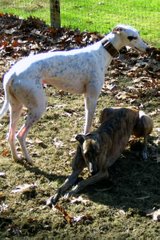In the late 20th century several Greyhound adoption groups were formed. The early groups were formed in large part out of a sense of concern about the treatment of the dogs while living on the track. These groups began taking greyhounds from the racetracks when they could no longer compete and placing them in adoptive homes. Prior to the formation of these groups, in the United States over 20,000 retired greyhounds a year were euthanized; recent estimates still number in the thousands, with about 90% of National Greyhound Association-registered animals either being adopted, or returned for breeding purposes (according to the industry numbers upwards of 2000 dogs are still killed annually in the US while anti-racing groups estimating the figure at closer to 12,000.).[8]
Accidents and disease are also common killers among racing greyhounds. In 2005, an epidemic of respiratory failure killed dozens of dogs and left over 1200 quarantined in the U.S., particularly in Massachusetts, Colorado, Iowa and Rhode Island[citation needed].
The vast majority of greyhounds are bred for racing (registered with the National Greyhound Association or NGA), leading American Kennel Club registered dogs about 150:1[citation needed]. Each NGA dog is issued a Bertillon card, which measures 56 distinct identifying traits with the Bertillon number tattooed on the dog's ear to prove identity during their racing career.
There are several reasons why some National Greyhound Association greyhounds may never race:
The dog is too slow.
The dog has physical defects.
The dog does not have the required temperament.
The dog has no desire to race anymore.
There are currently two online databases to easily lookup or search for all past and present registered dogs: Greyhound-Data.com and Rosnet2000.com Dogs can be searched by their Bertillon number, race name, and other attributes. Data includes dog photos, race statistics, and pedigree.
Most NGA greyhounds finish racing between two and five years of age. Some retired racing greyhounds have injuries that may follow them for the remainder of their lives, although the vast majority are healthy and can live long lives after their racing careers are over.[citation needed]
Greyhound. (2007, July 8). In Wikipedia, The Free Encyclopedia. Retrieved 21:38, July 8, 2007, from http://en.wikipedia.org/w/index.php?title=Greyhound&oldid=143366863
Interested in Adopting a Greyhound?
Sunday, July 8, 2007
Subscribe to:
Post Comments (Atom)

No comments:
Post a Comment